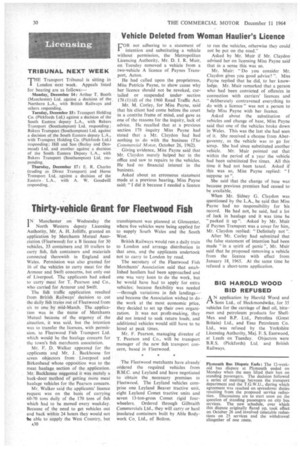Thirty-vehicle Grant for Fleetwood Fish
Page 32

If you've noticed an error in this article please click here to report it so we can fix it.
IN Manchester on Wednesday the
North Western deputy Licensing Authority, Mr, A. H. Jollitfe, granted an application by Merchants Mutual Association (Fleetwood) for a B licence for 30 vehicles, 33 containers and 10 trailers to carry fish, fish containers and materials connected therewith in England and Wales. Permission was also granted for 16 of the vehicles to carry meat for the Armour and Swift concerns, but only out of Liverpool. The applicants had asked to carry meat for T. Pearson and Co.. who carried for Armour and Swift.
The fish traffic application resulted from British Railways' decision to cut the daily fish trains out of Fleetwood from six to one by mid-March. The application was in the name of Merchants Mutual because of the urgency of the situation, it was said, but the intention was to transfer the licences, with permission, to Fleetwood Fish Transport Ltd. which would be the haulage concern for the town's fish merchants association.
Mr. F. D. Walker appeared for the applicants and Mr. J. Backhouse for seven objectors from Liverpool and Birkenhead whose opposition was to the meat haulage section of the application. Mr. Backhouse suggested it was merely a back-door method of getting more meat haulage vehicles for the Pearson concern.
Mr. Walker said the applicants' licence request was on the basis of carrying 60-70 tons daily of the 170 tons of fish which had to be moved every weekday. Because of the need to get vehicles out and back within 24 hours they would not be able to supply the West Country, but
A30
transhipment was planned at Gloucester, where five vehicles were being applied for to supply South Wales and the South West.
British Railways would run a daily train to London and arrange distribution in that area, and the applicants undertook not to carry to London by road.
The secretary of the Fleetwood Fish Merchants' Association said that established hauliers had been approached and one was very keen to do the work, but he would have had to apply for extra vehicles; because flexibility was needed —through variations in fish landings— and because the Association wished to do the work at the most economic price, they decided to set up their own organization. It was not profit-making, they did not intend to seek return loads, and additional vehicles would still have to be hired at peak times.
Mr. F. Pearson, managing director of T. Pearson and Co., will be transport manager of the new fish transport concern, based in Fleetwood.
The Fleetwood merchants have already ordered the required vehicles from B.M.C. and Leyland and have negotiated to obtain the , necessary premises in Fleetwood. The Leyland vehicles comprise one Leyland Beaver tractive unit, eight Leyland Comet tractive units and seven 13-ton-gross Comet rigid fourwheelers. Ordered through Gilbraith Commercials Ltd., they will carry or haul insulated containers built by Able Bodywork Co. Ltd., of Bolton.
















































































































